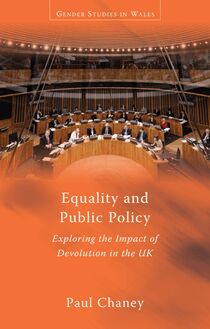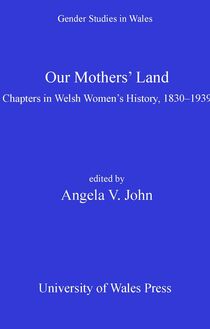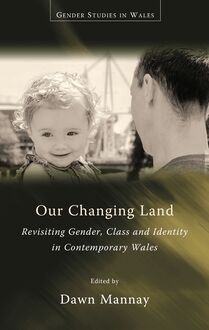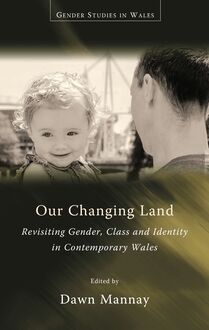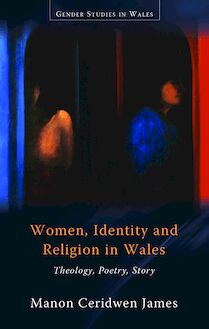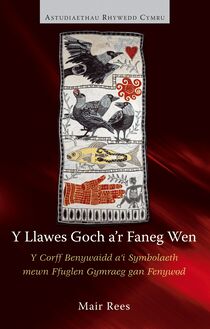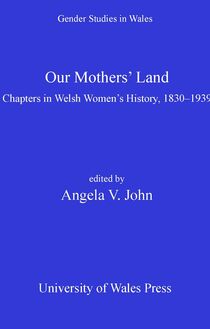-
 Univers
Univers
-
 Ebooks
Ebooks
-
 Livres audio
Livres audio
-
 Presse
Presse
-
 Podcasts
Podcasts
-
 BD
BD
-
 Documents
Documents
-
- Cours
- Révisions
- Ressources pédagogiques
- Sciences de l’éducation
- Manuels scolaires
- Langues
- Travaux de classe
- Annales de BEP
- Etudes supérieures
- Maternelle et primaire
- Fiches de lecture
- Orientation scolaire
- Méthodologie
- Corrigés de devoir
- Annales d’examens et concours
- Annales du bac
- Annales du brevet
- Rapports de stage
La lecture à portée de main
Vous pourrez modifier la taille du texte de cet ouvrage
Découvre YouScribe en t'inscrivant gratuitement
Je m'inscrisDécouvre YouScribe en t'inscrivant gratuitement
Je m'inscrisEn savoir plus
Vous pourrez modifier la taille du texte de cet ouvrage
En savoir plus

Description
This book assesses how policies developed by the National Assembly for Wales are affecting gender inequalities and investigates whether they are having an impact on social justice for women in Wales. In 1999 the first elections to devolved governments took place in Scotland and Wales. In Wales this resulted in 40 per cent of Assembly Members being women. In 2003 this proportion increased to 50 per cent which makes the National Assembly for Wales ‘the first legislative body with equal numbers of men and women in the world’ (“The Guardian”, 3/5/03). This new gender balance of political representatives is a significant change in the gendering of political institutions and this, together with the creation of a new tier of government, has the potential to create new opportunities for the development of social policies which address gender and other social inequalities. Focusing on distinct policy domains, this book explores gender politics in a devolved Wales. Each chapter investigates a particular aspect of social policy, exploring the way it has developed since devolution and the extent to which considerations of gender and social justice for women are central to this development. The empirical chapters which form the core of the book are situated theoretically and politically by the first chapter which discusses how gender and social justice can be theorised and explores devolution and its relation to gender politics in Wales.
Sujets
Informations
| Publié par | University of Wales Press |
| Date de parution | 15 janvier 2018 |
| Nombre de lectures | 0 |
| EAN13 | 9781783164233 |
| Langue | English |
Informations légales : prix de location à la page 0,0650€. Cette information est donnée uniquement à titre indicatif conformément à la législation en vigueur.
Extrait
GENDER AND SOCIAL JUSTICE IN WALES
Gender Studies in Wales Astudiaethau Rhywedd yng Nghymru
Series Editors
Jane Aaron, University of Glamorgan
Brec’hed Piette, University of Bangor
Sian Rhiannon Williams, University of Wales Institute Cardiff
Series Advisory Board
Deirdre Beddoe, Emeritus Professor
Mihangel Morgan, Aberystwyth University
Teresa Rees, Cardiff University
The aim of this series is to fill a current gap in knowledge. As a number of historians, sociologists and literary critics have for some time been pointing out, there is a dearth of published research on the characteristics and effects of gender difference in Wales, both as it affected lives in the past and as it continues to shape present-day experience. Socially constructed concepts of masculine and feminine difference influence every aspect of individuals’ lives; experiences in employment, in education, in culture and politics, as well as in personal relationships, are all shaped by them. Ethnic identities are also gendered; a country’s history affects its concepts of gender difference so that what is seen as appropriately ‘masculine’ or ‘feminine’ varies within different cultures. What is needed in the Welsh context is more detailed research on the ways in which gender difference has operated and continues to operate within Welsh societies. Accordingly, this interdisciplinary and bilingual series of volumes on Gender Studies in Wales, authored by academics who are leaders in their particular fields of study, is designed to explore the diverse aspects of male and female identities in Wales, past and present. The series is bilingual, in the sense that some of its intended volumes will be in Welsh and some in English.
GENDER AND SOCIAL JUSTICE IN WALES
Edited by
Nickie Charles and Charlotte Aull Davies
© The Contributors, 2010
All rights reserved. No part of this book may be reproduced in any material form (including photocopying or storing it in any medium by electronic means and whether or not transiently or incidentally to some other use of this publication) without the written permission of the copyright owner except in accordance with the provisions of the Copyright, Designs and Patents Act 1988 or under the terms of a licence issued by the Copyright Licensing Agency Ltd, Saffron House, 6–10 Kirby Street, London, EC1N 8TS. Applications for the copyright owner’s written permission to reproduce any part of this publication should be addressed to The University of Wales Press, 10 Columbus Walk, Brigantine Place, Cardiff, CF10 4UP.
www.uwp.co.uk
British Library Cataloguing-in-Publication Data
A catalogue record for this book is available from the British Library.
ISBN 978-0-7083-2268-0 e-ISBN 978-1-7831-6423-3
The rights of the Contributors to be identified as authors of their contributions has been asserted by them in accordance with sections 77, 78 and 79 of the Copyright, Designs and Patents Act 1988.
The publisher has no responsibility for the persistence or accuracy of URLs for any external or third-party internet websites referred to in this book, and does not guarantee that any content on such websites is, or will remain, accurate or appropriate.
Cover illustration: Sign people © Brandon Laufenberg, istockphoto.
Contents
Tables and Figures
Glossary
Notes on Contributors
1 Setting the Scene: Devolution, Gender Politics and Social Justice Nickie Charles
I. GENDER, POLITICAL REPRESENTATION AND SOCIAL JUSTICE
2 Delivery or Déjà Vu? Gender Mainstreaming and Public Policy in Post-devolution Wales Paul Chaney
3 Gender and Political Representation: Views from the Grass Roots Sandra Betts
II. SOCIAL JUSTICE FOR WOMEN?
4 Devolution, Gender and Childcare: A Distinctive Agenda for Wales? Wendy Ball
5 Developing a Domestic Abuse Strategy Nickie Charles and Stephanie Jones
6 Mainstreaming Across the Equality Dimensions: Policy on Sexual Orientation in Wales Alison Parken
7 Making the World New? Education in Post-devolution Wales Sue Sanders
8 Gendered Housing Policy: Women, Housing and Homelessness Susan Hutson and Tamsin Stirling
9 The Material Resources of Older Women in Wales and Welsh Assembly Government Policy Responses Vanessa Burholt
10 Devolution and Welsh Language Policy: A Gender Dimension? Charlotte Aull Davies
III. CONCLUSION
11 The Future Nickie Charles and Charlotte Aull Davies
Tables and Figures
Tables
3.1 Reasons for membership and participation in women’s organizations
7.1 Distribution of full-time qualified teaching staff in maintained primary schools in Wales by sex
7.2 Distribution of full-time qualified teaching staff in maintained primary schools in England by sex
7.3 Distribution of full-time qualified teaching staff in maintained secondary schools in Wales by sex
7.4 Distribution of full-time qualified teaching staff in maintained secondary schools in England by sex
8.1 Homelessness under the Welsh Assembly Government
9.1 Stepwise multiple linear regression model predicting material resources for men aged 50+ years in Wales
9.2 Stepwise multiple linear regression model predicting material resources for women aged 50+ years in Wales
Figures
2.1 Examples of gender equality policy outcomes
2.2 The Welsh Assembly Government’s equality impact assessment procedure
5.1 Domestic abuse policy timeline and selected key policy achievements
8.1 Women with dependent children compared with single households with a vulnerable member, 1999–2006
Glossary
ACCAC
Awdurdod Cymwysterau, Cwricwlwm ac Asesu Cymru / Qualifications, Curriculum and Assessment Authority for Wales. In 2006, ACCAC merged with the Welsh Assembly Government’s Department for Education Lifelong Learning and Skills (DELLS).
AM
Assembly Member (elected member of the National Assembly for Wales)
BAWSO
Black Association of Women Step Out. Voluntary organization, affiliated to Welsh Women’s Aid, providing specialist services to black and minority ethnic women and children.
Chwarae Teg
An organization helping women to enhance their employment prospects.
CRE
Commission for Racial Equality
Cymdeithas Tai Hafan (or Tai Hafan)
A housing association set up specifically to provide move-on accommodation for women and children leaving refuges.
EHRC
Equality and Human Rights Commission
EOC
Equal Opportunities Commission
EOC (Wales)
Welsh regional office of Equal Opportunities Commission
Estyn
Her Majesty’s Inspectorate for Education and Training in Wales
IDVA
Independent Domestic Violence Adviser
LGB
Lesbian, Gay, Bisexual
LGBT
Lesbian, Gay, Bisexual, Transsexual
MARAC
Multi-Agency Risk Assessment Conference
Merched y Wawr
National, voluntary women’s organization in Wales, similar to the Women’s Institute but its activities are conducted through the medium of Welsh.
MEWN Cymru
Minority Ethnic Women’s Network Wales
NAW
National Assembly for Wales
Plaid Cymru
The Party of Wales. Aims to attain full national status for Wales within the EU.
SARC
Sexual Abuse Referral Centres
Stonewall Cymru
Lesbian, gay, bisexual charity in Wales
SDVC
Specialist domestic violence court
Twf
‘Transmission within families’. A programme to promote the use of Welsh in families.
TGWU
Transport and General Workers’ Union
UNISON Wales/Cymru
Trade union for public sector workers in Wales
VSPC
Voluntary Sector Partnership Council
WAG
Welsh Assembly Government
WAW
Wales Assembly of Women
WI
Women’s Institute. Voluntary organization for women in the UK.
WWA
Welsh Women’s Aid
WRVS
Organization providing voluntary services to help older people.
WWNC
Wales Women’s National Coalition
Notes on Contributors
Wendy Ball is a senior research officer in the Centre for Children and Young People’s Health and Well-Being in the School of Human and Health Sciences, Swansea University. Wendy was a research fellow at the Centre for Research in Ethnic Relations, University of Warwick, for several years before moving on to lectureships in sociology at various universities. In 2002 Wendy joined Swansea University as a postgraduate research student in sociology and she was awarded her Ph.D. in 2007. This research explored childcare policy and service delivery in Wales following devolution and involved ethnographic fieldwork with families with young children in Swansea. This research is to be published in the Politics and Society in Wales series for University of Wales Press. Wendy is currently conducting research into the demand for children’s services in a Welsh local authority with reference to issues of parenting support.
Sandra Betts is a lecturer in sociology at Bangor University. Her research interests and publications include the family in Wales, civil society in Wales, the impact of devolution on women’s groups in Wales, inclusive and participatory governance and devolution.
Vanessa Burholt is professor of Gerontology and director of the Centre for Innovative Ageing at Swansea University. She is a social gerontologist with fifteen years’ experience of conducting research with older people. She has been involved in longitudinal projects (for example, the twenty-year Bangor Longitudinal Study of Ageing) and projects that span European and international locations. These include Families and Migration: Older People from South Asia and a six-country European Study of Adult Well Being. More recently she has directed a participatory project with Age Concern Gwynedd a Môn (Rural North Wales Initiative for the Development of Support for Older People – RuralWIDe) in which older people were trained as researchers. Her areas of expertise include intergenerational relationships; support and social relationships; rurality; attachment to place, housing and migration of older people (including ethnic minority elders) and she has published widely on these topics. Vanessa holds a public appointment as the research member on the National Partnership Forum for Older People in Wales.
Paul Chaney is senior
-
 Univers
Univers
-
 Ebooks
Ebooks
-
 Livres audio
Livres audio
-
 Presse
Presse
-
 Podcasts
Podcasts
-
 BD
BD
-
 Documents
Documents
-
Jeunesse
-
Littérature
-
Ressources professionnelles
-
Santé et bien-être
-
Savoirs
-
Education
-
Loisirs et hobbies
-
Art, musique et cinéma
-
Actualité et débat de société
-
Jeunesse
-
Littérature
-
Ressources professionnelles
-
Santé et bien-être
-
Savoirs
-
Education
-
Loisirs et hobbies
-
Art, musique et cinéma
-
Actualité et débat de société
-
Actualités
-
Lifestyle
-
Presse jeunesse
-
Presse professionnelle
-
Pratique
-
Presse sportive
-
Presse internationale
-
Culture & Médias
-
Action et Aventures
-
Science-fiction et Fantasy
-
Société
-
Jeunesse
-
Littérature
-
Ressources professionnelles
-
Santé et bien-être
-
Savoirs
-
Education
-
Loisirs et hobbies
-
Art, musique et cinéma
-
Actualité et débat de société
- Cours
- Révisions
- Ressources pédagogiques
- Sciences de l’éducation
- Manuels scolaires
- Langues
- Travaux de classe
- Annales de BEP
- Etudes supérieures
- Maternelle et primaire
- Fiches de lecture
- Orientation scolaire
- Méthodologie
- Corrigés de devoir
- Annales d’examens et concours
- Annales du bac
- Annales du brevet
- Rapports de stage
